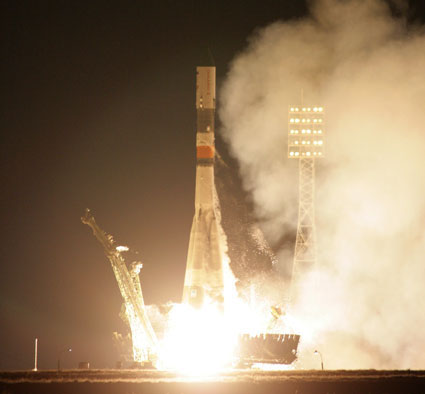Robotic Russian Cargo Ship Launches Toward Space Station

A Russian rocket carrying a new unmanned cargo ship liftedoff Wednesday with tons of fresh food and supplies for astronauts aboard theInternational Space Station.
The Soyuz rocket blasted off at 12:15 p.m. EDT (1615 GMT)from the Central Asian spaceport of Baikonur Cosmodrome in Kazakhstan carryingthe robotic Russian-built space freighter Progress 37. The cargo ship is due toarrive at the orbiting laboratory Saturday afternoon.
Tucked aboard Progress 37 are 2.6 tons (2,359 kg) of freshfood, science equipment and other supplies for the six astronauts living aboardthe nearly complete International Space Station. The spacecraft is due to dockat the station's Earth-facing Pirs docking port on Saturday at 2:35 p.m. EDT(1835 GMT).
NASA officials said Progress 37 is hauling 1,918 pounds (870kg) of propellant, 110 pounds (50 kg) of oxygen and air, 220 pounds (100 kg) ofwater, and about 3,301 pounds (1,497 kg) of experiment hardware and spare parts.
The spacecraft is also carrying some special care packagesfor the space station crew. Candy, books, and new movies are just some of thefun items making the extra-special delivery, according to Russian news reports.
The space station is currently hometo six people ? its full population. The crew includes two Russians, twoAmericans and a Japanese astronaut. Veteran Russian cosmonaut Oleg Kotovcommands the group.
Russia's Federal Space Agency (Roscosmos) regularly launchesunmanned Progress cargo ships to resupply the station crew. Progress 37, known toRussians as M-05M, is the 37th such ship to head toward the space station,which has been under construction since 1998.
Get the Space.com Newsletter
Breaking space news, the latest updates on rocket launches, skywatching events and more!
Progress vehicles resemble the three-module Soyuz spacecraftbuilt to ferry astronauts and cosmonauts to and from the space station, butinstead of a crew capsule at their center, the unmanned versions carry a roundpod packed with fuel for the space station.
Progress spacecraft can also autonomously fly themselves tothe space station and dock at one of its four Russian parking spots, though cosmonautsdo monitor their approach and can take remote control from inside the stationif something goes wrong.
After several months at the space station, the Progressvehicles are jettisoned to make room for more spacecraft carrying supplies orastronauts.
Last week, the automated Progress 35 spacecraft ? whichlaunched in October 2009 ? undocked from the space station. After remaining inorbit for several days to perform science experiments, the spacecraft fired itsengine Tuesday to intentionally destroy itself by burning up during re-entryover the Pacific Ocean.
The space station astronauts are preparing for a busy monthahead. NASA plans to launch the spaceshuttle Atlantis on its last-ever spaceflight to deliver a new Russianmodule for the $100 billion space station.
Liftoff of Atlantis is currently targeted for May 14 fromNASA's Kennedy Space Center in Florida.
- TheTop 10 Russian Space Missions
- NASA'sMost Memorable Missions
- MorningStar: The Pre-dawn Launch of Shuttle Discovery
Join our Space Forums to keep talking space on the latest missions, night sky and more! And if you have a news tip, correction or comment, let us know at: community@space.com.

Tariq is the Editor-in-Chief of Space.com and joined the team in 2001, first as an intern and staff writer, and later as an editor. He covers human spaceflight, exploration and space science, as well as skywatching and entertainment. He became Space.com's Managing Editor in 2009 and Editor-in-Chief in 2019. Before joining Space.com, Tariq was a staff reporter for The Los Angeles Times covering education and city beats in La Habra, Fullerton and Huntington Beach. In October 2022, Tariq received the Harry Kolcum Award for excellence in space reporting from the National Space Club Florida Committee. He is also an Eagle Scout (yes, he has the Space Exploration merit badge) and went to Space Camp four times as a kid and a fifth time as an adult. He has journalism degrees from the University of Southern California and New York University. You can find Tariq at Space.com and as the co-host to the This Week In Space podcast with space historian Rod Pyle on the TWiT network. To see his latest project, you can follow Tariq on Twitter @tariqjmalik.









